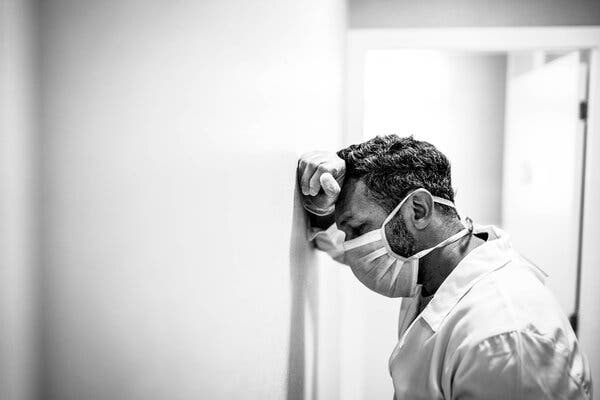To the Editor:
Re “Give Health Workers Hazard Pay,” by Sandeep Jauhar (Opinion guest essay, Jan. 10):
As a fellow physician at Northwell, I appreciate Dr. Jauhar’s sentiment regarding hazard pay for work in the hospital since Covid-19 changed the medical landscape so dramatically. Surely a bonus would be a confirmation of public recognition of the sacrifices we’ve made and continue to make in the riskier environment we now work in.
But, in truth, as we are all vaccinated (Northwell readily followed New York State guidelines for health care workers), there is certainly less personal risk than in the first terrifying months of the pandemic, when many doctors, nurses, paramedics and other selfless health care workers sickened and often died.
Today extra hazard pay is more of a request for the public we work so hard to care for to take notice of us, and to appreciate what we continue to do every day. The serenading and public displays of gratitude to health care workers back in the early days were a little over the top … but we do miss the sentiment.
What I would prefer over hazard pay would be for every one of our patients to get vaccinated and boostered, as we request constantly. That would be what would make me happy. That would be the ultimate gesture of appreciation to all those toiling to help sick patients — and the community’s way of saying “we care about you.”
Jessica Jacob
Great Neck, N.Y.
To the Editor:
As someone who has unfortunately been hospitalized four times over the past six months, I wholeheartedly agree with the premise of this essay. While most health care workers choose their careers for other than monetary reasons, many of them are significantly underpaid for the highly difficult and dangerous work they do.
I was a surgical patient in Rhode Island for removal of kidney stones and a hernia repair, and in New York for a total knee replacement. In both hospitals, the care provided to me by the surgeons, nurses, physical therapists, aides, food service workers and everyone else was extraordinary. Everyone I came in contact with was professional and compassionate, and seemed to consider me their most important patient.
While I doubt that health care workers would or could provide a higher level of care if they were paid more, I fully believe that paying them more would go a long way toward making these essential workers feel more appreciated and respected.
We have spent billions trying to test, treat and cure people infected with Covid-19. Let’s tell our health care workers we understand the life and death work they do, including risking their own lives to save ours.
Henry A. Lowenstein
New York
To the Editor:
Hazard pay for orderlies, technicians, respiratory therapists and nurses (and also teachers, home health aides and all other underpaid and at-risk workers)? Absolutely!
Hazard pay for doctors? I’m sorry. No.
As a physician myself, I can attest that doctors in the United States are already paid at rates far above their colleagues in other countries. American doctors grappling with Covid need many things; more pay isn’t one of them.
Wesley H. Clark
Middlebury, Vt.
Space Heater Risks and the Fire in the Bronx
To the Editor:
Re “Despite Gains, Space Heaters Pose Fire Risk” (news article, Jan. 11):
With regard to the Bronx fire and space heaters: For the over 44 years I’ve lived in our New York apartment, management has continually cut back on oil to heat the building. When my daughter was an infant, there were times when we had to put her to bed in a snowsuit. Over the last several winters some building tenants have purchased space heaters for warmth against inadequate heating.
Is management’s stinginess on paying for oil worth the risk of a building fire?
Margot Head
New York
How I Entertain My Young Kids
To the Editor:
Re “Parents, It’s Going to Be a Very Long January” (Opinion, nytimes.com, Jan. 8):
Jessica Grose flawlessly depicts the challenges of entertaining young children when the options are scarce, and screens masquerade as virtual babysitters.
Over Christmas break, my wife and I would knock out 45 minutes each night, with our three young kids, by driving around and looking at Christmas lights. Now, with the holidays passed but the same hours to fill, we may be forced to settle for streetlights. And if that fails to hold their interest, we’ll pray for a clear sky and resort to “chasing the moon.”
Andrew Ginsburg
Southport, Conn.
Ketamine: It’s Complicated
To the Editor:
Re “I Took Ketamine for My Depression. Things Got Pretty Weird” (Opinion guest essay, Dec. 28):
Vanessa Barbara’s description of her experience illustrates the complicated nature of treatment with ketamine. People take it seeking relief, but it’s not just another antidepressant. Its neurochemical effects are complicated, and while there are mood-elevating effects for many, these effects often aren’t maintained.
There remains the concern that temporary mood elevation could for some fuel an addictive dynamic. Alternatively, the dissociative and hallucinogenic effects may be critical for the drug’s effectiveness. Some people may benefit considerably from the altered state of consciousness and change in perspective they experience, perhaps in combination with psychotherapy.
Or, for those who haven’t tried it, it could be worth exploring psychotherapy without the ketamine. Drugs can be inspiring, but are not the only way to have a transformative experience.
Elizabeth Weinberg
Arlington, Mass.
The writer is a psychiatrist.































